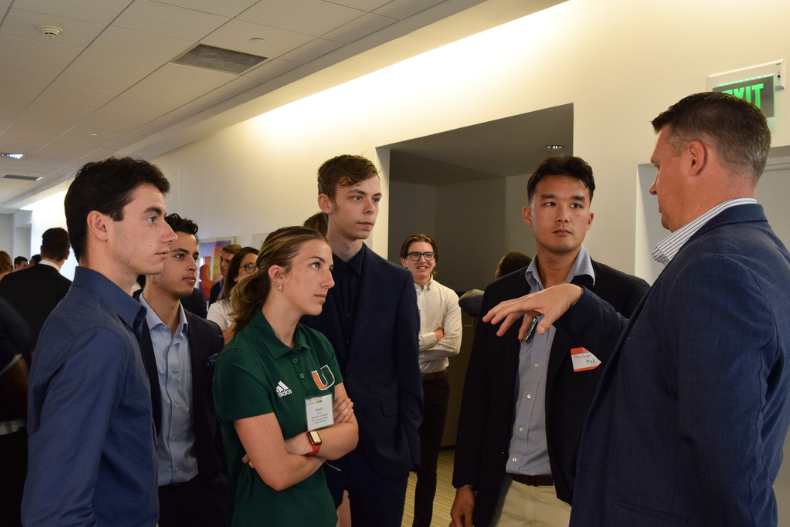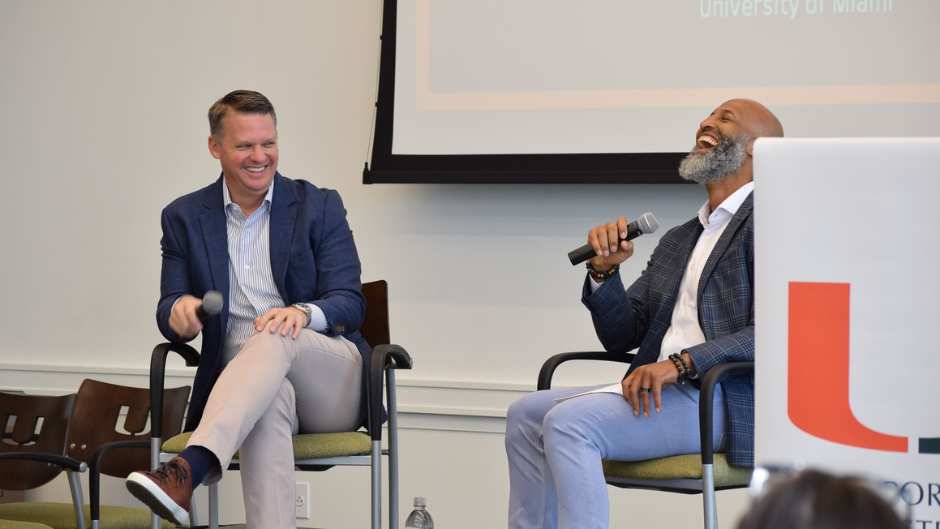When Tyler Epp, president of the Formula 1 Crypto.com Miami Grand Prix, tells you success in sports is all about relationships, it’s more than a generic bit of career advice.
Epp, whose wide-ranging career includes stints with Major League Baseball, the National Football League, NASCAR, and now Formula One racing, has an impressive story to back it up.
When he was just starting out as an intern at a Kansas City racetrack, making $6.50 an hour, he was assigned to escort legendary quarterback Joe Montana, who was a partner in the Chip Ganassi racing team, around the track.
That day, Epp made what he thought was a casual connection with one of the team officials—"just two guys talking at the racetrack," he said.
That conversation would affect his life and career for years to come, Epp told a rapt audience of sport administration students, faculty, and sport industry officials at the ninth annual Global Sport Industry Conference, held at the Donna E. Shalala Student Center.
"I gave him my business card—I’d literally made it myself—and within six weeks, I was interviewing, and then shortly after that, I was working for him," Epp said. "That one person has had a greater impact on my career than anyone else, including my decision to leave the NFL a few years ago and come down here to Miami."
Epp regaled students with stories of how he navigated his career, including candid observations about keeping a fan base engaged—"the #1 challenge of any sports organization"—and how globalization has dramatically changed the world of sports.
"The world has shrunk and it’s easier to get to places," he said. "For us, it’s no longer just about cars. It’s about the experience you are providing. It’s the food, the beverages, the art, the entire cultural event."
Epp stressed that, regardless of the sport, the fundamentals of sport management do not change. He urged students to be open to seizing opportunities as they come, rather than holding out for what they think will be a "dream job" in a specific sport.
"These are all revenue-driven sports organizations," he explained. "What I learned in NASCAR can apply with the Kansas City Chiefs. Always be willing to try something new. My current job found me. There are many paths to find your way in this business."
Harrison Blech, who is pursuing a master’s in sport administration through UOnline, said he found that message about different career paths particularly inspiring.
"That was most impactful for me, the idea that there is no correct path in the sports industry," said Blech. "Many of the panelists said their careers took multiple unexpected twists and turns that led them to the positions they are in today."

A similar message emerged during the Green Future Forum, a panel on sustainability that featured leaders from the Miami Dolphins, Miami Heat, and Florida Panthers.
Teddy Lhoutellier, sustainability director for the University, said diverse paths is one of the great things about a career in sustainability.
"It’s a big umbrella and there are a lot of different components underneath it," he said. "There is tremendous opportunity. You are working toward a higher purpose. It can be hard to define but it also keeps the job fun and rewarding."
Cynthia Miller, director of health, safety, and environment for the Miami Dolphins, said she sees her position as a "platform to change the world."
She noted that the 37-year-old Hard Rock Stadium, where the Dolphins and Miami Hurricanes play, had recently received its LEED Gold certification for sustainability, a recognition that is often difficult for older facilities to obtain.
"It’s about changing the culture, from top leadership to every staff member," she said. "Hard Rock is now a plastic-free facility, and our goal is to be as close to carbon zero as we can be. To send nothing to the landfill that we shouldn’t be. We are very proud of that."
For the Florida Panthers, conducting a sustainability impact assessment throughout the organization was a critical first step, said Michael Prairie, director of sustainability and business optimization.
"It’s given us a framework to continue moving forward," said Prairie, who noted that he is the first to hold his position in the organization. "We’ve made tremendous strides in a short amount of time, but we know we’ve got to get better across the board."
Blech, who said he hopes to work in venue management one day, said it was exciting to hear what local sports teams are doing for the environment.
"I have a passion for environmental sustainability, so it was inspiring hearing how some of South Florida's most prominent sports venues are positioning themselves for a more sustainable future," he said. "My favorite aspect was hearing about the Florida Panthers’ initiative to create fully circular and reusable aluminum cups for their fans."
Though each year, the topics and panelists are different, the conference is an invaluable experience for her sport administration students, both online and on campus, said professor Windy Dees, graduate program director in sport administration.
"The event brings in top industry professionals and executives from around the world of sports," she said. "Both our on-campus and UOnline students get an incredible opportunity to learn from the best in the business about trends and best practices in sport management. The networking opportunities are invaluable."
For UOnline student Blech, attending the conference on campus was a game-changer.
"I met some of my professors face to face for the first time," said Blech, who lives in Fort Lauderdale. "I was able to establish real connections, which will help me grow my network in the sports industry for the future."
Professor Erin McNary has led the conference for seven years and said comments from students like "career changing" and "left feeling inspired" let her know how valuable the event has become. She said the event would not be possible without the planning committee made up of sport administration students.
"I enjoy coordinating this event because it brings together members of our sport administration community, such as industry professionals, UM athletic directors, professors, alumni, staff, students, and community members," she said. "We all had similar end goals of educating or learning about the "evolution and growth of the sport industry," this year's conference theme, discussing best practices to be successful, and creating long lasting personal and professional relationships."

